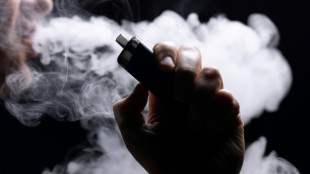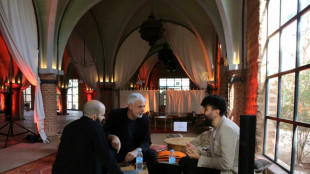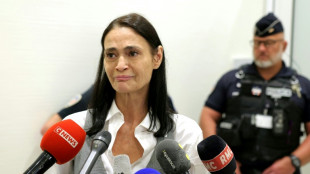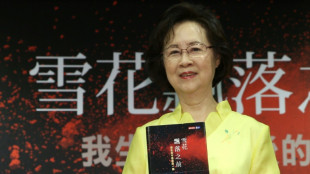
-
 Warhammer maker Games Workshop enters London's top stocks index
Warhammer maker Games Workshop enters London's top stocks index
-
Iran Nobel winner released for three weeks, 'unconditional' freedom urged

-
 Red Cross marks record numbers of humanitarians killed in 2024
Red Cross marks record numbers of humanitarians killed in 2024
-
Johnson's Grand Slam 'no threat', says World Athletics boss Coe

-
 Qatar's emir and UK's Starmer talk trade as state visit ends
Qatar's emir and UK's Starmer talk trade as state visit ends
-
Cuba suffers third nationwide blackout in two months

-
 Russia, Ukraine to send top diplomats to OSCE summit in Malta
Russia, Ukraine to send top diplomats to OSCE summit in Malta
-
Spanish royals to attend memorial service for flood victims

-
 LPGA, USGA new policy requires female at birth or pre-puberty change
LPGA, USGA new policy requires female at birth or pre-puberty change
-
Stick to current climate change laws, US tells top UN court

-
 British Museum chief says Marbles deal with Greece 'some distance' away
British Museum chief says Marbles deal with Greece 'some distance' away
-
Pope Francis receives electric popemobile from Mercedes

-
 Gaza civil defence: thousands flee Israeli strikes, evacuation calls
Gaza civil defence: thousands flee Israeli strikes, evacuation calls
-
Trump names billionaire private astronaut as next NASA chief

-
 Pidcock to leave INEOS Grenadiers at end of season
Pidcock to leave INEOS Grenadiers at end of season
-
Seoul stocks weaken, Paris advances despite political turmoil

-
 South America summit hopes to seal 'historic' trade deal with EU
South America summit hopes to seal 'historic' trade deal with EU
-
DAZN awarded global TV rights for Club World Cup

-
 Top executive shot dead outside New York hotel
Top executive shot dead outside New York hotel
-
Vaping while still smoking unlikely to help quitters: study

-
 British Museum chief says Parthenon Marbles deal with Greece 'some distance' away
British Museum chief says Parthenon Marbles deal with Greece 'some distance' away
-
'Creating connections': Arab, African filmmakers gather at Morocco workshops

-
 Iran frees Nobel winner for three weeks, sparking calls for 'permanent' release
Iran frees Nobel winner for three weeks, sparking calls for 'permanent' release
-
Brazil's Minas cheese gets added to UNESCO list

-
 Top US executive shot dead in New York City: media
Top US executive shot dead in New York City: media
-
Trump's nominee to run Pentagon hangs by a thread

-
 GM announces more than $5 bn hit to earnings in China venture
GM announces more than $5 bn hit to earnings in China venture
-
World chess champ Ding, teen challenger tied past halfway mark

-
 Georgia police raid opposition offices as PM vows to curb protests
Georgia police raid opposition offices as PM vows to curb protests
-
S. Korea opposition begins push to impeach president

-
 Syrian army fights rebel offensive with counterattack
Syrian army fights rebel offensive with counterattack
-
France court upholds Polanski acquittal in defamation case

-
 UK bans daytime TV ads for cereals, muffins and burgers
UK bans daytime TV ads for cereals, muffins and burgers
-
Palace's Guehi to face no formal action over 'Jesus' message on rainbow armband

-
 UK faces trade balancing act with Trump, EU
UK faces trade balancing act with Trump, EU
-
Iran releases Nobel Peace laureate Mohammadi on medical leave: lawyer

-
 UNESCO grants heritage status to Aleppo soap as Syria war flares
UNESCO grants heritage status to Aleppo soap as Syria war flares
-
Ghana's illegal mining boom seeps into presidential election

-
 Inconsistent Spurs 'progressing in all aspects': Postecoglou
Inconsistent Spurs 'progressing in all aspects': Postecoglou
-
France's Orano says Niger junta controls uranium firm

-
 Seoul stocks weaken, Paris edges up tracking political turmoil
Seoul stocks weaken, Paris edges up tracking political turmoil
-
China reports warmest autumn since records began

-
 French marine park to close over law banning killer whale shows
French marine park to close over law banning killer whale shows
-
Thousands march demanding S. Korea president resign over martial law debacle

-
 Taiwan romance novelist Chiung Yao dies at 86
Taiwan romance novelist Chiung Yao dies at 86
-
In Angola, Biden promises to invest differently to China

-
 Syrian army launches counteroffensive against rebels
Syrian army launches counteroffensive against rebels
-
Evenepoel says 'long journey' ahead after postal van collision

-
 South Korea's day of rage as Yoon's martial law founders
South Korea's day of rage as Yoon's martial law founders
-
UK police question killer nurse Letby over further baby deaths


Team behind film about world's first IVF baby hope to spread joy and debate
The makers of a new film about the British pioneers of IVF hope it highlights the "fragile" status of fertility treatment, with perceived threats in places like the United States and dwindling availability in the UK.
"Joy", released Friday on Netflix, chronicles the sustained and wide-ranging opposition that a trio of UK scientists faced while pioneering the then-highly contentious in vitro fertilisation treatment in the late 1960s and '70s.
Featuring "Love Actually" star Bill Nighy, James Norton and Thomasin McKenzie, it tracks their struggles in the face of a media- and church-led backlash, which culminated in the successful 1978 birth of Louise Joy Brown.
Brown, the world's first baby born through IVF, is now 46 and told AFP she welcomes the film, which gives the trio "the recognition that they all deserve".
But despite more than 10 million IVF births since hers, the film's release comes with fertility treatment increasingly attacked by some US conservatives and legal efforts to curb its use gaining traction.
Religious and cultural conservatism in other countries, including in Europe, and stretched public healthcare finances have seen its availability increasingly limited.
For the stars and creators of "Joy", that all makes their movie set five decades ago as relevant as ever.
"We sit on the shoulders of many, many people who have given a lot and for us to be 50 years later at a place where that progress is incredibly fragile is very, very scary," Norton told AFP in a recent interview.
"That's why this film is so fortuitously important."
- 'Fear' -
Director Ben Taylor, who has two children conceived through IVF, said the filmmakers wanted "to celebrate and tell the story of the origin of this world-changing procedure" rather than focus on contemporary controversies.
"But our story is about opposition too. It's about fear. It's about ignorance and the people that were trying to get in the way of something that was only being developed purely for good, purely to give families hope," he explained.
"So if it holds up a mirror to that similar conversation now, I would hope it proves the same."
With a taut script, humour and uplifting soundtrack -- which opens with The Beatles' "Here Comes the Sun" -- "Joy" turns a potentially dry tale of scientific discovery into a funny and heartwarming story.
Its makers opted to tell it through Jean Purdy (played by McKenzie), a nurse and embryologist whose pivotal role in pioneering IVF was long overlooked.
Her name was only added to a blue plaque at the northern English hospital where the team laboured for years in 2015.
For four decades prior to that, the plaque had only honoured her male colleagues, 2010 Nobel Prize for medicine laureate Robert Edwards (Norton) and Patrick Steptoe (Nighy).
Purdy's airbrushing from recognition is what first attracted Nighy to the role.
"It was another opportunity to put a bomb under the male tendency to dismiss women's contribution to anything," he explained.
"There are many, many cases, from DNA to IVF."
- 'Personal' -
In addition to Taylor, a number of other people involved in "Joy" had direct experience of using IVF to conceive, making the filmmaking process highly emotional.
"A lot of personal experience has gone into this movie, both in the writing and the making," noted Norton. "It was evident on the page -- I cried when I read it."
Husband and wife co-writers Jack Thorne and Rachel Mason, who went through seven rounds of IVF before welcoming their son, hope the film will raise awareness about the treatment's decreasingly mass availability in Britain.
Mason said the country's cash-strapped National Health Service increasingly rations access, so it was now down to "where you live or how much money you have".
"The people that get to do IVF now are the people that can afford to do it," echoed Thorne.
"It's wrong... and hopefully this film poses the question about how we feel as a society about it."
Brown noted that that went against the ethos of the pioneering scientists' she owes her life to.
She grew up knowing the trio, likening them to "a big extended family", and forged a decades-spanning friendship with Edwards in particular.
He attended her wedding and met her own children.
"Bob, Patrick and Jean wanted it to be available for everybody -- normal, everyday, working people -- and I agree," Brown said before last month's London Film Festival premiere of "Joy".
"I think everybody should be able to have it."
O.Krause--BTB
